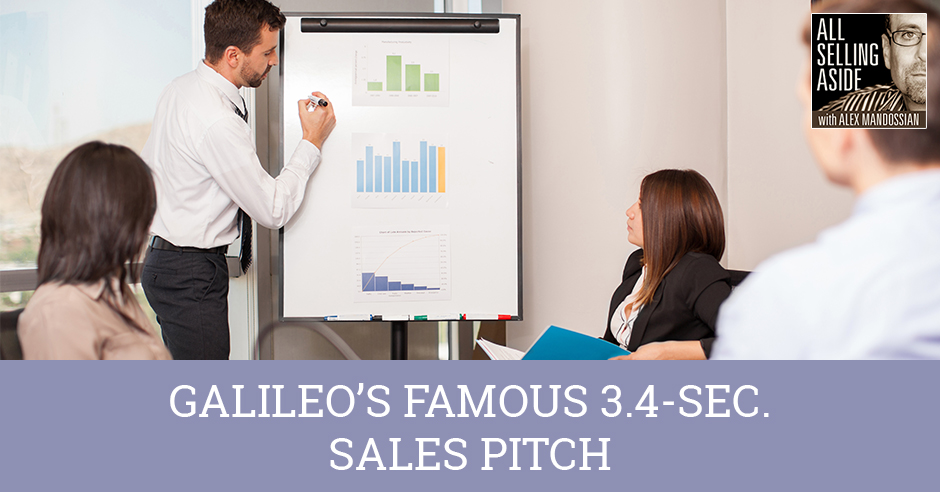
In marketing, it’s about testing and tracking – crafting a sales pitch, brainstorming strategies, and ensuring its application is pursued and aligned, and so on. Galileo’s experiment on the two cannonballs perfectly mirrors what marketing is today.
Going back to scientific methods, Alex unravels the power of demonstration to gain trust and attract more sales. Discover why believability is the toughest sales barrier of all and learn that it’s important to understand the emotion you’re selling not just what you’re selling. On top of it all, find out why you control 83% of the psychology in any sale.
—
Listen to the podcast here:
Galileo’s Famous 3.4-Sec. Sales Pitch
The Principle Of Gravity
It was a warm afternoon in the 16th century. Galileo Galilei climbed up all 294 steps of the Leaning Tower of Pisa and dropped two cannonballs. When those two cannonballs crashed to the ground, it reshaped the destiny of mankind to its last syllable of recorded time. This was an experiment that ended a 2,000-year-old method of thinking and demonstrated a new discovery about the principle of gravity.
If you haven’t heard the story, before Galileo, people blindly believed a heavier object would fall faster than a lighter one and the authority would establish that dictum. The person who came up with that was none other than the great Aristotle. Aristotle was mentored by Plato. Plato was mentored by Socrates. Do you know who Aristotle mentored himself? It was none other than Alexander the Great. This is one of our great thinkers and many of the governments on Earth now are a direct result of Aristotle’s work.
How could a guy this smart living over 2,500 years ago say that an object that’s heavier will fall faster than an object that’s lighter? Here’s what Galileo did. The two cannon balls were different weights. One weighed twice as much as the other one. When he dropped them, both of them landed at the same time.
If you drop a feather, because of wind resistance, a feather will drop slower, but gravity has the same impact on that feather. In fact, if you put a feather in a vacuum so that there’s no wind resistance, then a cannonball and a feather will fall just as fast. I know it doesn’t seem real, but I’ve seen it in my physics class in high school and I’ll always remember it.
Try this. You can take a pen and you can take a marker. Maybe the marker weighs twice as much as the pen but drop it at chin-level. Take an almond and a plastic bottle of water so it doesn’t shatter and drop it. That almond and that a bottle of water will fall at the same time.
I do this demonstration on stage all the time. Why was Galileo’s experiment important? That was the day the scientific method was born, because people believed an object twice as heavy would fall twice as fast. Why? It’s because of who said it, Aristotle. The scientific method is unbiased to who is conducting the experiment. The scientific method is a demonstration that people were shocked to see the two cannonballs crashed to the ground at the same time.
As that happened, it changed their whole sense of thinking. It was the end of the pre-scientific civilization. The observation was not just the fact in falling objects, but it represented a whole new problem-solving method. The problems and the methods to solve them were no longer driven by politics or authority or prestige. Rather, it was to the authority of experimenting and observing, which what marketing is now.
Experience is the only teacher. Share on XMarketing is the scientific method in the world of business. Since Galileo’s time, 500 years have elapsed and we’re not talking about cannonballs anymore. We’re talking about opt-ins. We’re talking about sales. We’re talking about tested sentences that work better than others.
Gravity in a marketing funnel doesn’t exist. That’s the problem with marketing funnels. It doesn’t take the traditional funnel which is either having water go through it or maybe grains of sand going through it. Gravity’s pulling something through the funnel. There is no gravity in a marketing funnel. In the marketing funnel, the only gravity you have is your ethical influence, which is the purpose of this show.
This show is about ethical influence and it is possible if you hate to sell to be good at the storytelling process which in return will help you sell because anyone can tell a good story.
You can learn how to tell good stories and that’s why I have a story in every episode because there’s a moral in every story and stories are more entertaining. Ethical influence is more about storytelling than it is about selling. If you can think of all the objections your candidates will have, there are typically five to nine objections. Have a story that can unlock those objections.
You’re not going to hit them like a shovel to the forehead and say, “I want to change your mind,” because I don’t think that’s possible. You have to change the way they think and have them look at a landscape with a new pair of eyes.
Marcel Proust said, “True discovery is not about seeking new landscapes. It’s about seeing the same landscape with new eyes.” The reason I bring up Galileo is that in marketing, it’s about testing and tracking. It’s about split testing A or B. Which works better, buy-one-get-one-free, or two for the price of one?
When I was in direct response television, buy one get one free worked better. How do I know? I tested it. Sales and marketing are not intuitive. It’s counterintuitive. Operators are standing by or if you call and the lines are busy, try again. Which one pulled more sales? If you call and the lines are busy, pull more. You can give dozens of reasons why you think that is, but rather than trying to rationalize it, test it.
What I give you in this show and in my training are pre-tested materials that work. One of the tested ways is to start with a story. The moral of Galileo’s story is that nothing is as powerful as a demonstration. When you demonstrate something, it’s super powerful.

Sales Pitch: There is no gravity in a marketing funnel. In the marketing funnel, the only gravity you have is your ethical influence.
There’s Alexism which I always utter from the stage. I say, “Experience is the best teacher.” Everyone says, “Right.” I say, “Wrong,” and they look at me and I say, “Experience is the only teacher. If you’re a parent, raise your hand,” and the parents raise their hand. I say, “You know that’s true? If you’re a parent of teenagers, please raise your hand,” and they laugh and they raise their hands. I have two teenagers and I will tell you nothing could have prepared me for it.
Experience is not the best teacher. Experience is the only teacher which is what Galileo did brilliantly. He was a brilliant inventor and thinker too in the University of Pisa where he hung out. He invented lots of things and contributed to the invention of the metronome and to the telescope.
The Six Barriers That Prevent A Sale
Aristotle was a great thinker, but he didn’t do it through demonstration. He did it through thinking. Galileo did it through doing. Let’s go over the six barriers that prevent a sale or influencing anyone. You’ve heard it in previous episodes. The first three barriers are why people buy and they’ll only buy if they know you, they like you or they trust you. Those are all barriers to if they don’t know, like or trust you.
The four other barriers are why people won’t buy. If you recall in the previous episode, it’s that they don’t understand you, they don’t believe you or it’s not the right time. Otherwise, you haven’t prequalified the timing. You control 83% of the psychology of any sale. I believe you can control people knowing, liking, and trusting you. I believe you can control you getting them to understand you.
You can get them to believe you. What you can’t control is bad timing. My good friend in college, Jimmy DeVito, tried to sell me life insurance and that wasn’t the right time as a single male in college in debt. After I got married, the timing was better for life insurance when I started having a family because there would be someone for me to leave behind.
Timing is what you want to go after, but what do you think the most difficult of the six barriers are? I believe it is believability. Getting people to know, like you and trust you, that can be done. Getting people to understand you, I didn’t do a good job with my Push Button Influence launch I had with my former partner. That’s in a previous episode that they didn’t understand the offer, always start with the offer.
What you can't control is bad timing. Share on XTiming, I can prequalify my candidates and make sure the timing is right. If I’m going to get them into a $25,000 mastermind and they paid $10,000 to be at a two-day event and there’s only $15,000 more for them to get the full benefits of the mastermind and I make an offer. I know the timing is right because they’re ready. That is a real mastermind that’s called the Genius Network run by my good friend, Joe Polish.
I gave the presentation for a panel to candidates. There may be 80 people in the room and we generated over $800,000 in new members because the timing was perfect. They knew us, they liked us, they trusted us, they understood the offer and most importantly, they believed us. Me specifically because I was leading the panel.
Selling With Emotion
Believability is what you have to go after because I believe it’s the toughest barrier of all. Here is the bad news about believability. Just because you tell the truth doesn’t mean they believe you. Sometimes a truth takes 2,000 years or more to be believed. Sometimes the people who are lying are the ones who were believed. Look at politics. When you look at believability, I like to start with emotion because emotion is the opener to believability.
Getting them to understand you logically is important, but belief comes from emotion which is why storytelling is the best and easiest way to sell. There’s emotion involved, there’s logic involved with a moral, there’s entertainment involved. They’re getting to know you, like you, and trust you. They may like the story for different reasons why that you do and who cares. As long as they understand it, believe it and maybe the timing is right for them to say yes. If you start with the emotion, ask yourself, “What emotion am I selling here?”
I’ll give you an example. In the business of car washes, what emotion is the car wash selling you? When you’re going through and you’re paying $30 or $40 or $50 in the US to get your car washed, what’s the emotion they’re selling? I believe self-esteem.
A clean car has a much more positive view on you than if someone is using their finger to say, “Wash me,” because the windows are dirty and that’s happened to me when I was in high school with my Volkswagen Jetta. Carwashes sell the emotion of self-esteem. What about organized religion or any spiritual tradition? What’s the emotion they’re selling? It’s a powerful emotion. What is it? I don’t think it’s salvation.
The emotion any spiritual tradition or religion is selling is hope. Hope is not defined by knowing how to get from point A to point B. That’s not hope. That’s the emotion of confidence, which is an emotion you probably are selling, which sales are a transfer of confidence. Hope is simply acknowledging there is a point B. Faith and hope. That’s what a spiritual tradition is selling.

Sales Pitch: Storytelling is the best and easiest way to sell because there’s emotion, there’s logic with a moral, and, there’s entertainment involved.
In the personal development business, they’re selling confidence. Here’s how to get from point A to point B. All the how-to courses, they’re selling confidence. I sell confidence. In coaching, what are you selling? Not to get unstuck or to get untrapped in whatever struggle you may be in.
Coaching is selling the emotion of clarity and even more powerful maybe certainty. There’s a lot of uncertainty and a coach can assist you in finding certainty and moving past the uncertainty. A skilled coach will do it through questions. What’s the emotion a theme park is selling? Fun and joy. What do Mark Zuckerberg and all the people at Facebook, what are they selling? It’s a feeling of belonging and you can go on.
If you understand the emotion you’re selling, then you know that you can get someone to believe you. If you have a great demonstration like Galileo did and you believe that experience is the only teacher and you can overcome the six barriers that prevent a sale or prevent you from influencing others. You will be better than you think you are in ethical influence and that’s my wish for you.
Here’s our review about the three specific insights you and I rediscovered in this episode. Being truthful and being believable is not the same thing. Believability is the toughest of all the six barriers that prevent you from ethical influence. We talked about how a demonstration is super powerful.
Ultimately, if you see something, it’s more likely to be believed. We also talked about bad timing. Bad timing is the only roadblock of the six you can’t control but you can prequalify bad timing through an application process or through questions that made sure that timing is tipping the scales in your favor.
With any kind of misunderstanding or confusion, there’s never a buyer. Confused minds don’t buy. These insights can only work for you if you work them.
I want you to go to AllSellingAside.com/iTunes and type in your biggest takeaway or type in your a-ha moment you may have experienced during this episode. If you’ve already done this in previous episodes, then iTunes allows one review or one a-ha moment or take away the way I define it. I invite you to write it on an index card and keep a record of it and see over the weeks the new a-ha moments and takeaways that you get.
If you haven’t done it, you can do this in the review section. When you do it, iTunes will ask you to rate the episode. I hope I’ve earned five stars from you. It’s a more creative way of getting a review instead of saying, “Alex has a great podcast,” or “I love All Selling Aside.”
Being truthful and being believable are not the same thing. Share on XWhy not get specific and put an a-ha moment from the specific episode that’ll be super interesting to friends or colleagues who go there and read it. It’ll be more interesting to me because I will be getting demonstrable feedback from you as Galileo did with his cannonballs on what was important to you for the future. Socratically, like Socrates, this is how I get feedback.
Go ahead. Declare your one big takeaway in the iTunes review section by visiting AllSellingAside.com/iTunes. That forwards directly to my iTunes channel. It’ll take just three minutes out of your day but what you declare could provide you a lifelong worth of learning.
I have one final gift to give you in honor of this fifth episode of the show, and that’s a complimentary copy of my eBook titled Alexisms: Useful Life Lessons from a Recovering Serial Entrepreneur. I don’t know if you’re a serial entrepreneur or if you’re recovering, but Alexisms are useful lessons and little 140 character or fewer lines that you hear during my episodes.
The one I gave to you today is, “Experience is not the best teacher. Experience is the only teacher. You can instantly download it at AlexismsBooks.com. That does it for this episode. I hope our paths cross again next episode for the show that’s dedicated to making ethical influence within your reach so that you can achieve and even exceed your sales potential.
Please do whatever it takes to join me next episode because our topic will be, “Why Indecision Assassinates Innovation.” I encourage you not only to read but invite a friend or bring a study buddy. Work together with these a-has and takeaways because you’ll be a better ethical influencer. I can’t wait to connect with you then. All good wishes.
Important Links:
- Previous episode – All Selling Aside episode
- Genius Network
- AllSellingAside.com/iTunes
- AlexismsBooks.com




